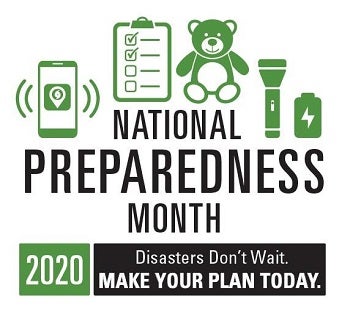
As wildfires continue to threaten many communities in California, it is important to make sure you are prepared in case a wildfire affects your community. Below are steps that you can take now to better prepare your household.
Get Ready
- Make a plan
- Making a plan and practicing it is vital. Your plan should include evacuation routes, a communication plan, a reunification plan, pet/livestock plan, and a checklist of items to take.
- Build a grab and go emergency bag, include:
- A supply of medications, along with a list of the medications with dosages.
- Cash (small bills)
- Important contact information (family, friends, work, doctor, etc.)
- Copies of important documents including insurance, deeds, leases, etc. (consider also keeping a copy in a secure cloud storage)
- Childcare needs
- First aid kit
- Water and non-perishable food
- Pet care needs
- Hand sanitizer (at least 60% alcohol)
- Two face coverings person
- Cleaning materials
- Protect your home
- Ensure you have adequate home insurance
- Ensure that your brush clearance is completed
- Sign up for your local emergency notifications
Get Set
If a wildfire is approaching your community, you should:
- Park your vehicle with the front facing the street (if possible)
- Pack your car with your go bag and other necessary items
- If you have pets, ensure they are ready to go with leashes or carriers easily accessible
- Remove any flammable items from around the exterior of you home (decorations, patio furniture, etc.)
- Monitor the news and be prepared to immediately respond to any evacuation order
Go!
When should I leave?
- You should leave immediately if your household is placed under an evacuation order
- You do not have to wait to for an evacuation order to leave. Consider leaving early. By doing so, you reduce the likelihood of being trapped by traffic congestion or the first itself.
Lisa Martin, executive director of the office of emergency management advises that during an emergency "There is so much that we can’t control, but we can control our attitude and how we face it. We will get through wildfire season together as a bruin community because of the strength that we have. It will be okay. We will come out stronger on the other end."
For more detailed information, please check out these resources:
- LAFD’s Ready, Set, Go!
- VCFD’s Ready, Set, Go!
- VCFD’s Wildfire Action Plan
- Ready.gov Wildfire
